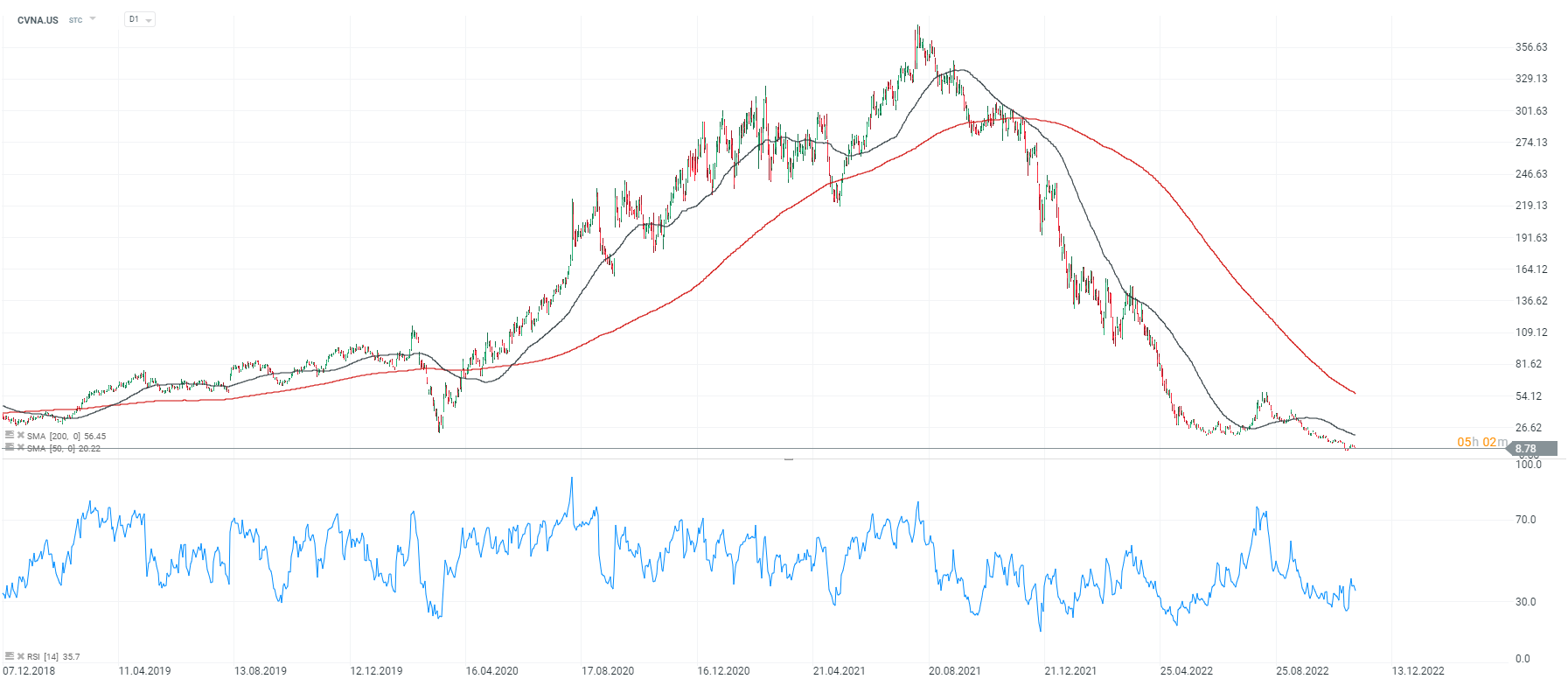Shares of Carvana (CVNA.US), until recently still the fastest growing used car sales platform in the US, are under pressure today, losing nearly 13%. The stock has lost nearly 96% since the beginning of the year amid significant debt, rising interest rates and decelerating sales. U.S. used car sales fell by about 13% year-on-year in the third quarter of 2022, which is reflected in the company's results. Huge declines were also reported today by 'second-hand' auto parts supplier Advance Auto Parts (AAP.US):
- Carvana reported a drop in sales in the third quarter to $3.4 billion from $3.5 billion in the third quarter of 2021. Wall Street had expected results of $3.7 billion;
- According to FactSet, the company has between $6 billion and as much as $7 billion in debt and no cash on its balance sheet. The company also still does not have positive cash flow. Net debt relative to cash on the balance sheets of non-bank companies in the S%P500 index is on average double that of Carvana;
- On Tuesday, analysts at Oppenheimer downgraded the car dealer's stock from Buy to Hold, despite a nearly exponentially declining valuation. The analysts cited significant operational and financial risks in the short term as most relevant to the company's stock price.
- The company, despite the proposal, did not respond to the analysts' assessment. In September, Oppenheimer analysts' target price was $51; today the stock is worth less than $9;
- Carvana's management sees some weakness in the used car market. In August, as interest rates rose and demand for used cars weakened, Carvana set a goal of generating positive free cash by cutting costs so that the company could finance itself without the need for additional debt or equity;
- Cavana did not achieve its goals. The company again used nearly $200 million more in cash than it expected. Wall Street does not project full-year positive free cash flow until 2026;
Used car demand in face off implosion?
JP Morgan analysts pointed out that Carvana is still a long way from recovery because even if the industry reaches its price bottom, analysts still do not see significant potential for a rebound and a quick return to upward trends. Last week, Morgan Stanley also withdrew its recommendation along with its price target for the company. The analysts cited a deteriorating used car market and a volatile financing environment. The market for used car dealers, including Carvana, is getting tougher and Wall Street does not see the potential for a significant change. In an environment of more expensive credit, higher fuel prices and inflation eating away at savings, consumers are clearly slowing their buying tendencies. On the other hand, we can expect that if the company survives the hard times without going bankrupt it could be better viewed by the market. This probably won't happen quickly, and the Fed's path to its 2% inflation target may prove harder. Once inflation falls significantly and hawkish sentiment passes, buying trends will likely slowly begin to recover.
 Carvana (CVNA.US) shares chart, D1 interval. Source: xStation5
Carvana (CVNA.US) shares chart, D1 interval. Source: xStation5

Is a recovery on the cards? A deep dive into why bitcoin is weighing on tech stocks

Morning wrap: Tech sector sell-off (06.02.2026)

Amazon shares tumble 10% as investors recoil at the price of AI dominance

Disaster for Volvo shares. Is this the end of an iconic brand?
This content has been created by XTB S.A. This service is provided by XTB S.A., with its registered office in Warsaw, at Prosta 67, 00-838 Warsaw, Poland, entered in the register of entrepreneurs of the National Court Register (Krajowy Rejestr Sądowy) conducted by District Court for the Capital City of Warsaw, XII Commercial Division of the National Court Register under KRS number 0000217580, REGON number 015803782 and Tax Identification Number (NIP) 527-24-43-955, with the fully paid up share capital in the amount of PLN 5.869.181,75. XTB S.A. conducts brokerage activities on the basis of the license granted by Polish Securities and Exchange Commission on 8th November 2005 No. DDM-M-4021-57-1/2005 and is supervised by Polish Supervision Authority.


